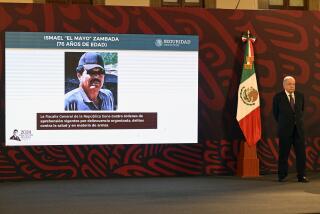Mexico to Seek Fraud Case Extraditions : U.S. Citizens Implicated in $34-Million Currency Scheme
SAN DIEGO — Mexican officials said Tuesday that they will seek the extradition of several U.S. citizens and Mexican nationals living in the United States in connection with an intricate $34-million currency fraud scheme.
Seven Mexican citizens already have been arrested in the case and are scheduled for arraignment today before a Tijuana judge on charges of fraud, bribery and falsification of documents. The scheme allegedly victimized the Mexican government and several branches of nationalized banks in Tijuana and Mexicali.
The requests for extradition will not be completed for several weeks, the officials said, and it could be months before U.S. officials decide whether they will be honored. The Americans being sought were not identified Tuesday.
Prosecutors Jose Franco Villa and Jaime Torres Espinosa said Tuesday that the suspects in this case might constitute only one of a number of rings conducting similar schemes. Their investigation will take in each of the more than 20 branches of nationalized banks in Tijuana and Mexicali.
7 Arrested Last Weekend
Franco and Torres said that the seven men arrested last weekend, including banking and customs officials, are charged with improperly taking advantage of a regulation that allows Mexican businesses that must purchase goods in the United States to exchange pesos for dollars at a preferential rate.
The currency exchanges are by law to be made only for the purchase of American goods not manufactured in Mexico. The seven men allegedly participated in a scheme to obtain the American currency at the preferential rate of about 215 pesos per dollar, then sell those dollars at a San Ysidro currency exchange for about 245 pesos per dollar, the current market rate.
Mexican authorities believe that the seven men--with the aid of several people working on the U.S. side of the border--exchanged about $34 million since last February, illegally pocketing more than $4 million.
Franco and Torres said the ring allegedly created two phony corporations and claimed they were purchasing agricultural equipment from the firms.
Mexican authorities said Tuesday that the government’s dual exchange program would be temporarily suspended in many Baja California banks until the investigation is completed.
More to Read
Sign up for Essential California
The most important California stories and recommendations in your inbox every morning.
You may occasionally receive promotional content from the Los Angeles Times.










